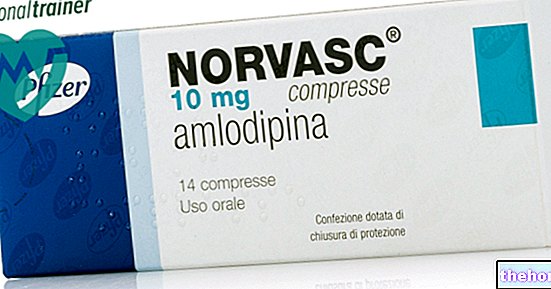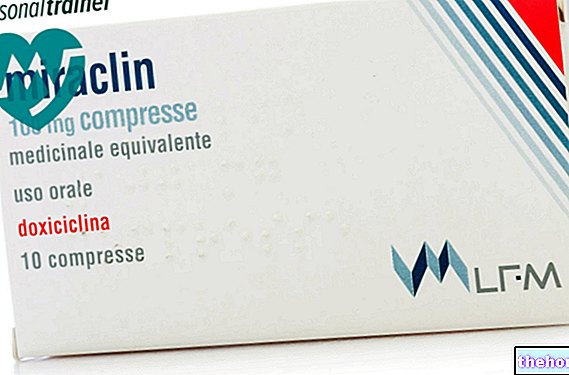Active ingredients: Ketoprofen
Ketoprofen Alfa Wassermann 25 mg film-coated tablets
Why is Ketoprofen Tablets used - Generic Drug? What is it for?
Ketoprofen Alfa Wassermann belongs to the class of non-steroidal anti-inflammatory drugs (NSAIDs) whose action is aimed at reducing inflammation and relieving pain.
Ketoprofen Alfa Wassermann contains the active ingredient ketoprofen and can be used for the treatment of pain of various origins and nature (headache, toothache, neuralgia, pain in the bones, joints and muscles, menstrual pain).
Contraindications When Ketoprofen Tablets - Generic Drug should not be used
Do not take Ketoprofen Alfa Wassermann
- if you are allergic to ketoprofen or other similar medicines (anti-inflammatories, acetylsalicylic acid and its derivatives, etc.) or to any of the other ingredients of this medicine (listed in section 6);
- if you have manifestations such as rash, internal inflammation of the nose (rhinitis), asthma;
- if you suffer from "inflammation of the lining of the stomach (gastritis) and chronic digestive problems (dyspepsia);
- if you have a disease called porphyria;
- if you have an alteration in the production of blood cells, such as a low number of platelets (thrombocytopenia) or white blood cells (leukopenia), with ongoing bleeding or predisposition to bleeding (haemorrhagic diathesis);
- if you are taking medicines to delay blood clotting (anticoagulants), anti-inflammatory medicines or medicines based on acetylsalicylic acid (such as aspirin);
- if you are being treated with drugs that increase urine production (intensive diuretic therapy);
- if you have severe kidney or liver problems (kidney or liver failure, kidney disease, liver cirrhosis, severe hepatitis);
- if you suffer from stomach or intestinal ulcer (active stomach or duodenal ulcer) or if you have previously suffered from stomach or intestinal bleeding (gastrointestinal bleeding), ulceration or perforation due to previous treatments;
- if you have suffered in the past from bleeding (haemorrhage) or open wounds developing on the lining of the stomach (recurrent peptic ulcer);
- if you have had major surgery;
- in case of severe heart problems (heart failure);
- if you are pregnant or suspected of being pregnant or breastfeeding (see "Pregnancy, breastfeeding and fertility");
- if you are under 15 years old.
Precautions for use What you need to know before taking Ketoprofen Tablets - Generic Drug
Talk to your doctor or pharmacist before taking Ketoprofen Alfa Wassermann
Stop taking Ketoprofen Alfa Wassermann if you notice bleeding or severe pain in your stomach or intestines (gastrointestinal bleeding or ulceration).
Take special care with Ketoprofen Alfa Wassermann and talk to your doctor:
- if you do not notice appreciable results after a short period (three days)
- if you have severe breathing difficulties (bronchospasm)
- if you suffer from a disease of the airways called chronic obstructive pulmonary disease
- if you suffer from asthma, hay fever (allergic rhinitis) or growths on the lining of the nose (nasal polyposis)
- if you suffer from liver or kidney disease
- if you have high blood pressure, as this can get worse (see 'Possible side effects').
Medicines such as Ketoprofen Alfa Wassermann may be associated with a modest increased risk of heart attack ("myocardial infarction") or stroke.
Elderly patients
Elderly patients more often experience side effects to anti-inflammatory medicines, resulting in bleeding and perforation of the stomach and intestines, which can be fatal. Take special care if you are an elderly patient and have any of the following conditions:
- insufficient blood supply to the kidneys
- kidney disease
- liver problems (cirrhosis of the liver or severe hepatitis).
Children and adolescents
Do not give Ketoprofen Alfa Wassermann to children and adolescents under the age of 15.
Interactions Which drugs or foods can modify the effect of Ketoprofen Tablets - Generic Drug
Tell your doctor or pharmacist if you are taking, have recently taken or might take any other medicines.
Do not take Ketoprofen Alfa Wassermann together with:
- Other anti-inflammatory drugs
- Warfarin, heparin, ticlopidine (Anticoagulants)
- Antiplatelet agents such as acetylsalicylic acid
- Antidepressants (SSRIs)
- Lithium
- Methotrexate used in high doses of 15 mg / week or more
- Idantoins (drugs to treat epilepsy) and sulphonamides (antibiotics).
Take special care if you are already taking the following medicines:
- Diuretics, medicines used for blood pressure (ACE inhibitors and angiotensin II antagonists), especially in elderly patients
- Methotrexate, used in low doses, less than 15 mg / week
- Pentoxifylline (antithrombotic medicine)
- Zidovudine
- Oral hypoglycemic agents (sulfonylureas)
- Medicines that regulate the activity of the heart (Beta-blockers)
- Ciclosporin and tacrolimus (immunosuppressive medicines)
- Thrombolytics
- Probenecid (gout medicine)
because Ketoprofen Alfa Wassermann could affect the action of these medicines or their toxicity
Warnings It is important to know that:
Pregnancy, breastfeeding and fertility
If you are pregnant or breast-feeding, think you may be pregnant or are planning to have a baby, ask your doctor or pharmacist for advice before taking this medicine.
Pregnancy
Do not take Ketoprofen Alfa Wassermann during pregnancy or if you suspect a pregnancy.
Feeding time
Do not take Ketoprofen Alfa Wassermann while breastfeeding.
Fertility
Administration of Ketoprofen Alfa Wassermann should be discontinued in women who have fertility problems or who are undergoing fertility investigations.
Driving and using machines
If you experience lightheadedness, sleepiness, headache or dizziness after administration of Ketoprofen Alfa Wassermann, do not drive or use any tools or machines.
Ketoprofen Alfa Wassermann contains azorubine and cochineal red
A Ketoprofen Alfa Wassermann contains azorubine (E 122) and cochineal red A (E 124) as coloring agents, which can cause allergic reactions.
Dosage and method of use How to use Ketoprofen Tablets - Generic Drug: Dosage
Always take this medicine exactly as described in this leaflet or as directed by your doctor or pharmacist. If in doubt, consult your doctor or pharmacist.
Adults and children over 15 years of age
The recommended dose is 1 tablet in a single dose, or repeated 2-3 times a day, in case of particularly severe pain.
Take Ketoprofen Alfa Wassermann on a full stomach with a glass of water
Elderly patients
Elderly patients should adhere to the minimum dosages indicated above.
Do not exceed the indicated doses and do not use the medicine for more than three days, without the advice of your doctor.
Overdose What to do if you have taken an overdose of Ketoprofen Tablets - Generic Drug
If you take more Ketoprofen Alfa Wassermann than you should
In case of accidental ingestion / intake of an overdose of Ketoprofen Alfa Wassermann, notify your doctor immediately or go to the nearest hospital.
Symptoms of an overdose can include:
- headache
- dizziness
- confusion and loss of consciousness
- pain, nausea, vomiting
- bleeding in the stomach and intestines
- low blood pressure
- breathing problems (respiratory depression)
- bluish discoloration of the skin and mucous membranes (cyanosis)
If you forget to take Ketoprofen Alfa Wassermann
Do not take a double dose to make up for a forgotten tablet.
If you stop taking Ketoprofen Alfa Wassermann
If you have any further questions on the use of Ketoprofen Alfa Wassermann, ask your doctor or pharmacist
Side Effects What are the side effects of Ketoprofen Tablets - Generic Drug
Like all medicines, this medicine can cause side effects, although not everybody gets them.
Undesirable effects can be minimized by using the lowest effective dose for the shortest possible duration of treatment. The most commonly observed undesirable effects relate to the stomach and intestines. By taking the medicine on a full stomach, the frequency and extent of these effects are significantly reduced.
Common side effects (may affect up to 1 in 10 people) include:
- nausea, vomiting
- diarrhea, gas in the abdomen (flatulence), constipation, difficult digestion, pain in the abdomen
- blood in the stool, vomiting with blood
- mouth ulcerations
- aggravation of inflammatory bowel diseases (colitis, Crohn's disease).
Uncommon side effects (may affect up to 1 in 100 people) include:
- stomach inflammation (gastritis)
- mood changes
- ringing in the ears
- headache, dizziness
- dizziness
- drowsiness
- changes in taste
- rash, itching
Rare side effects (may affect up to 1 in 1000 people) include:
- ulcer and perforation of the stomach or intestines, bleeding from the stomach or intestines
- insomnia, altered sensation (tingling) of a part of the body, agitation
- increased blood pressure
- local or general increase in the diameter of blood vessels
- increase in certain indices of liver function (transaminases)
- inflammation of the liver (hepatitis)
- various skin reactions (hives, red spots, pustules or blisters)
- difficulty in breathing, swelling of the upper respiratory tract (throat)
- hair loss
- abnormal kidney function tests
- poor kidney function (acute kidney failure)
- inflammation of the kidneys (interstitial nephritis)
- series of symptoms due to impaired kidney function (nephrotic syndrome)
- lack of strength
- weight gain
- inability of the heart to pump blood adequately (heart failure), heart pounding.
Very rare side effects (may affect up to 1 in 10,000 people) include:
- decrease in white blood cells and blood platelets, decrease in red blood cells (anemia) due to bleeding, disappearance of a type of white blood cell in the blood (agranulocytosis), decrease in all blood cells
- hypersensitivity reactions, up to anaphylactic shock
- severe skin reactions (exfoliative dermatitis, Stevens-Johnson syndrome and toxic epidermal necrolysis)
- angioedema (rapid swelling of the skin or mucous membranes)
- photosensitization (reactions on the skin after sun exposure)
- vision problems (blurred vision)
- asthma attacks, narrowing of the bronchi (bronchospasm), particularly in patients known to be allergic to acetylsalicylic acid and other non-steroidal anti-inflammatory drugs
- local or general swelling (especially in patients with high blood pressure)
Reporting of side effects
If you get any side effects, talk to your doctor or pharmacist. This includes any possible side effects not listed in this leaflet. You can also report side effects directly via the national reporting system at https://www.aifa.gov.it/content/segnalazioni-reazioni-avverse By reporting side effects you can help provide more information on the safety of this medicine
Expiry and Retention
Keep this medicine out of the sight and reach of children.
Do not use this medicine after the expiry date which is stated on the package and which refers to the unopened, correctly stored product. The expiry date refers to the last day of that month.
Do not use this medicine if the pack has been opened or damaged.
Do not throw any medicines via wastewater or household waste. Ask your pharmacist how to throw away medicines you no longer use. This will help protect the environment.
What Ketoprofen Alfa Wassermann contains
- The active ingredient is ketoprofen. Each coated tablet contains 25 mg of ketoprofen.
- The other ingredients are: microcrystalline cellulose, pregelatinised starch, anhydrous colloidal silica, magnesium stearate, polyvinyl alcohol, titanium dioxide (E 171), macrogol, talc, azorubine (E 122), cochineal red A (E 124), indigo carmine (E 132 ).
Description of the appearance of Ketoprofen Alfa Wassermann and contents of the pack
Ketoprofen Alfa Wassermann comes in the form of round, biconvex pink tablets.
Carton of 10 or 20 film-coated tablets, in blister packs. Not all pack sizes may be marketed.
Source Package Leaflet: AIFA (Italian Medicines Agency). Content published in January 2016. The information present may not be up-to-date.
To have access to the most up-to-date version, it is advisable to access the AIFA (Italian Medicines Agency) website. Disclaimer and useful information.
01.0 NAME OF THE MEDICINAL PRODUCT
KETOPROFENE ALFA WASSERMANN 25 MG TABLETS COATED WITH FILM
02.0 QUALITATIVE AND QUANTITATIVE COMPOSITION
One film-coated tablet contains:
Active principle:
Ketoprofen 25 mg.
Excipients:
Azorubine 0.011 mg
Cochineal red A 0.009 mg.
For the full list of excipients, see section 6.1.
03.0 PHARMACEUTICAL FORM
Film-coated tablet.
04.0 CLINICAL INFORMATION
04.1 Therapeutic indications
Pain of various origins and nature (headache, toothache, neuralgia, osteo-joint and muscle pain, menstrual pain).
04.2 Posology and method of administration
Adults and children over 15 years: 1 tablet in single or repeated dose 2 - 3 times a day, in painful forms of greater intensity, preferably on a full stomach (with a glass of water).
Do not exceed the recommended doses: in particular elderly patients should follow the minimum dosages indicated above.
The duration of the therapy must be limited to the overcoming of the painful episode.
04.3 Contraindications
Ketoprofen is contraindicated in the following cases:
• Hypersensitivity to the active ingredient, or to other similar drugs (anti-inflammatory drugs, acetylsalicylic acid and its derivatives, etc.), hypersensitivity to any of the excipients;
• Manifestations with skin rashes, rhinitis, asthma;
• Gastritis and chronic dyspepsia;
• Porphyria, leukopenia or thrombocytopenia, with ongoing bleeding or bleeding diathesis;
• ongoing treatment with anticoagulants as it synergizes their action;
• During intensive diuretic therapy;
• Severe renal insufficiency;
• Severe liver failure (liver cirrhosis, severe hepatitis);
• Active peptic ulcer, or a history of gastrointestinal haemorrhage, ulceration or perforation related to previous active treatments or history of recurrent peptic haemorrhage / ulcer (two or more distinct episodes of proven ulceration or haemorrhage);
• Following major surgery;
• Severe heart failure.
Ketoprofen is also contraindicated in pregnancy (established or suspected), during lactation (see section 4.6) and in children under 15 years of age.
It is contraindicated to administer Ketoprofen Alfa Wassermann together with anti-inflammatory drugs and acetylsalicylic acid.
04.4 Special warnings and appropriate precautions for use
The product, like all non-steroidal anti-inflammatory drugs, interferes with the synthesis of prostaglandins and their important intermediates that participate in physiological functions.
The drug, therefore, requires special precautions, or it must be excluded from use, when the following conditions are present in the patient: states of kidney hypoperfusion, kidney disease, liver cirrhosis or severe hepatitis.
The product should only be used under medical supervision in subjects with bronchospasm or with chronic obstructive pulmonary disease, asthma, allergic rhinitis (hay fever), or nasal polyposis, as well as in case of liver disease or nephropathy.
After a few days of treatment without noticeable results, consult your doctor.
The medicine contains azorubine (E 122) and cochineal red A (E 124) as coloring agents, which can cause allergic reactions.
The use of Ketoprofen Alfa Wassermann, as well as any drug that inhibits prostaglandin synthesis and cyclooxygenase, is contraindicated in women who intend to become pregnant.
Administration of Ketoprofen Alfa Wassermann should be discontinued in women who have fertility problems or who are undergoing fertility investigations.
The concomitant use of Ketoprofen Alfa Wassermann with other NSAIDs, including selective cyclooxygenase-2 inhibitors, should be avoided.
Undesirable effects can be minimized by using the lowest effective dose for the shortest possible duration of treatment needed to control symptoms (see gastrointestinal and cardiovascular risks below).
Elderly: Elderly patients have an increased frequency of adverse reactions to NSAIDs, especially gastrointestinal bleeding and perforation, which can be fatal (see section 4.2 - Posology and method of administration).
Gastrointestinal effects
Gastrointestinal bleeding, ulceration and perforation: Gastrointestinal bleeding, ulceration and perforation, which can be fatal, have been reported during treatment with all NSAIDs, at any time, with or without warning symptoms or a previous history of serious gastrointestinal events.
Some epidemiological evidence suggests that ketoprofen may be associated with a higher risk of gastrointestinal toxicity, compared to other NSAIDs, especially at high doses (see also section 4.3 - Contraindications).
In the elderly and in patients with a history of ulcer, particularly if complicated with haemorrhage or perforation (see section 4.3), the risk of gastrointestinal bleeding, ulceration or perforation is higher with increasing doses of NSAIDs. These patients should start treatment with the lowest available dose. Concomitant use of protective agents (misoprostol or proton pump inhibitors) should be considered for these patients and also for patients taking low doses of aspirin or other drugs that may increase the risk of gastrointestinal events (see below and section 4.5 - Interactions with other medicinal products and other forms of interaction).
Patients with a history of gastrointestinal toxicity, particularly the elderly, should report any unusual gastrointestinal symptoms (especially gastrointestinal bleeding) particularly in the initial stages of treatment.
Caution should be exercised in patients taking concomitant medications that may increase the risk of ulceration or bleeding, such as oral corticosteroids, anticoagulants such as warfarin, selective serotonin reuptake inhibitors or antiplatelet agents such as aspirin (see section 4.5).
When gastrointestinal bleeding or ulceration occurs in patients taking Ketoprofen Alfa Wassermann the treatment should be discontinued.
NSAIDs should be administered with caution to patients with a history of gastrointestinal disease (ulcerative colitis, Crohn's disease) as these conditions may be exacerbated (see section 4.8 - Undesirable effects).
Skin effects
Serious skin reactions, some of them fatal, including exfoliative dermatitis, Stevens-Johnson syndrome and toxic epidermal necrolysis, have been reported very rarely in association with the use of NSAIDs (see section 4.8). In the early stages of therapy patients appear to be at higher risk: the onset of the reaction occurs in most cases within the first month of treatment. Ketoprofen Alfa Wassermann should be discontinued at the first appearance of skin rash, mucosal lesions or any other signs of hypersensitivity.
Cardiovascular and cerebrovascular effects
Adequate monitoring and instruction are required in patients with a history of mild to moderate hypertension and / or congestive heart failure as fluid retention, hypertension and edema have been reported in association with NSAID treatment.
Clinical studies and epidemiological data suggest that the use of some NSAIDs (especially at high doses and for long-term treatment) may be associated with a modest increased risk of arterial thrombotic events (eg, myocardial infarction or stroke). There are currently insufficient data to exclude a similar risk for ketoprofen when it is administered at a daily dose of 25 to 75 mg.
Patients with uncontrolled hypertension, congestive heart failure, established ischemic heart disease, peripheral arterial disease and / or cerebrovascular disease should only be treated with ketoprofen after careful consideration. Similar considerations should be made before initiating long-term treatment in patients with risk factors for cardiovascular disease (eg, hypertension, hyperlipidaemia, diabetes mellitus, smoking).
04.5 Interactions with other medicinal products and other forms of interaction
Corticosteroids: increased risk of gastrointestinal ulceration or bleeding (see section 4.4 - Special warnings and precautions for use).
Anticoagulants: NSAIDs may increase the effects of anticoagulants, such as warfarin (see section 4.4).
Antiplatelet agents and selective serotonin reuptake inhibitors (SSRIs): increased risk of gastrointestinal bleeding (see section 4.4).
Associations not recommended:
• Other NSAIDs, including high doses of salicylates (≥ 3 g / day): the concomitant administration of several NSAIDs may increase the risk of gastrointestinal ulcers and bleeding, due to a synergistic effect.
• Oral anticoagulants, parenteral heparin and ticlopidine: increased risk of bleeding due to inhibition of platelet function and damage to the gastrointestinal mucosa.
• Lithium (described with several NSAIDs): NSAIDs increase plasma levels of lithium (decreased renal excretion of lithium), which can reach toxic values. This parameter therefore needs to be monitored during initiation, dose adjustment and after discontinuation of ketoprofen treatment.
• Methotrexate, used at high doses of 15 mg / week or more: increased blood toxicity of methotrexate due to a decrease in its renal clearance due to anti-inflammatory agents in general.
• Hydantoins and sulphonamides: the toxic effects of these substances can be increased.
Associations requiring precaution:
Diuretics, ACE inhibitors and angiotensin II antagonists: NSAIDs may reduce the effect of diuretics and other antihypertensive drugs. In some patients with impaired renal function (eg dehydrated patients or elderly patients with impaired renal function) the co-administration of an ACE inhibitor or antagonist angiotensin II and agents that inhibit the cyclo-oxygenase system may lead to further deterioration of renal function, including possible acute renal failure, usually reversible. These interactions should be considered in patients taking Ketoprofen Alfa Wassermann concomitantly with ACE inhibitors or angiotensin II antagonists. Therefore, the combination should be administered with caution, especially in elderly patients.
Patients should be adequately hydrated and monitoring of renal function should be considered after initiation of concomitant therapy.
• Methotrexate, used in low doses, less than 15 mg / week: increased blood toxicity of methotrexate due to a decrease in its renal clearance due to anti-inflammatory agents in general. Perform weekly monitoring of the blood count during the first weeks of the association. Increase monitoring in the presence of even mild worsening of renal function, as well as in the elderly.
• Pentoxifylline: increased risk of bleeding. Increase clinical monitoring and check bleeding time more frequently.
• Zidovudine: risk of increased toxicity on the red cell line by action on reticulocytes, with severe anemia occurring one week after starting treatment with the NSAID. Check the complete blood count and reticulocyte count one or two weeks after starting treatment with the NSAID.
• Sulfonylureas: NSAIDs can increase the hypoglycemic effect of sulfonylureas by displacing them from plasma protein binding sites.
Associations that need to be considered:
• Beta-blockers: treatment with an NSAID can decrease their antihypertensive effect by inhibiting the synthesis of prostaglandins.
• Ciclosporin and tacrolimus: nephrotoxicity can be increased by NSAIDs due to effects mediated by renal prostaglandins. Renal function should be measured during associated therapy.
• Thrombolytics: increased risk of bleeding.
• Probenecid: plasma concentrations of ketoprofen may be increased; this interaction may be due to an inhibitory mechanism at the site of renal tubular secretion and glucuronide conjugation and requires an adjustment of the ketoprofen dose.
04.6 Pregnancy and lactation
Pregnancy
Ketoprofen Alfa Wassermann is contraindicated in case of confirmed or suspected pregnancy.
Inhibition of prostaglandin synthesis can adversely affect pregnancy and / or embryo / fetal development.
Results of epidemiological studies suggest an increased risk of miscarriage and cardiac malformation and gastroschisis after use of a prostaglandin synthesis inhibitor in early pregnancy. The absolute risk of cardiac malformations increased from less than 1% to approximately 1.5%. The risk has been believed to increase with dose and duration of therapy. In animals, administration of prostaglandin synthesis inhibitors has been shown to cause increased pre- and post-implantation loss and embryo-fetal mortality.
In addition, an increased incidence of various malformations, including cardiovascular, has been reported in animals given prostaglandin synthesis inhibitors during the organogenetic period.
During the third trimester of pregnancy, all prostaglandin synthesis inhibitors can expose the fetus to:
• cardiopulmonary toxicity (with premature closure of the arterial duct and pulmonary hypertension);
• renal dysfunction, which can progress to renal failure with oligo-hydroamnios;
the mother and the newborn, at the end of pregnancy, to:
• possible prolongation of bleeding time, and antiplatelet effect which may occur even at very low doses;
• inhibition of uterine contractions resulting in delayed or prolonged labor.
Feeding time
It is unknown whether Ketoprofen and its metabolites are excreted in milk.
A risk to newborns and infants cannot be excluded.
Ketoprofen Alfa Wassermann is contraindicated during lactation (see section 4.3).
Fertility
There are no clinical data on the possible effects of Ketoprofen Alfa Wassermann on male and female fertility.
Animal studies do not show any alterations in fertility.
04.7 Effects on ability to drive and use machines
Should light-headedness, somnolence or dizziness occur following administration of Ketoprofen Alfa Wassermann, the patient should avoid driving, operating machinery, or engaging in activities requiring special vigilance.
04.8 Undesirable effects
The most commonly observed adverse events are gastrointestinal in nature.
Peptic ulcers, gastrointestinal perforation or haemorrhage, sometimes fatal, may occur, particularly in the elderly (see section 4.4). The frequency and extent of these effects are significantly reduced by taking the drug on a full stomach.
Clinical studies and epidemiological data suggest that the use of some NSAIDs (especially at high doses and for long-term treatment) may be associated with a modest increased risk of arterial thrombotic events (eg, myocardial infarction or stroke) ( see section 4.4).
04.9 Overdose
Symptoms of overdose may include: central nervous system disorders, such as headache, dizziness, confusion and loss of consciousness, as well as pain, nausea and vomiting. Gastrointestinal bleeding, hypotension, respiratory depression and cyanosis can also occur. There are no specific antidotes. Overdose and accidental or deliberate ingestion should be treated symptomatically.
05.0 PHARMACOLOGICAL PROPERTIES
05.1 Pharmacodynamic properties
Pharmacotherapeutic group: non-steroidal anti-inflammatory / antirheumatic drugs / derivatives of propionic acid / Ketoprofen
ATC code: M01AE03.
Ketoprofen is a drug with anti-inflammatory, analgesic and antipyretic activity, belonging to the pharmacotherapeutic group of NSAIDs.
The anti-inflammatory and analgesic activity of ketoprofen is related to four well-documented mechanisms of action: stabilization of the lysosomal membrane; inhibition of prostaglandin synthesis; antibradykinin activity; antiplatelet activity.
05.2 "Pharmacokinetic properties
In humans the absorption of ketoprofen is very high. It reaches maximum plasma levels within 2 hours after oral administration.
Ketoprofen is 95-99% bound to plasma proteins. The elimination of ketoprofen is rapid and occurs essentially through the urine (from 50 to 80% in the glucuronide form), less than 10% is eliminated unchanged and minimally through the faeces (about 1%). The plasma half-life of ketoprofen ranges from 0.5 to 4 hours, 30-90% of the administered dose is excreted within 24 hours.
05.3 Preclinical safety data
Non-clinical data reveal no special hazard for humans based on conventional studies of repeated dose toxicity except as reported in section 4.8. The product has not been shown to be genotoxic or carcinogenic. As regards reproductive toxicity, it is not shown to be genotoxic or carcinogenic. there is further information beyond what is stated in section 4.6.
06.0 PHARMACEUTICAL INFORMATION
06.1 Excipients
Microcrystalline cellulose, pregelatinised starch, colloidal anhydrous silica, magnesium stearate, polyvinyl alcohol, titanium dioxide (E 171), macrogol, talc, azorubine (E 122), cochineal red A (E 124), indigo carmine (E 132).
06.2 Incompatibility
There are no known chemical-physical incompatibilities of ketoprofen with other compounds.
06.3 Period of validity
3 years.
06.4 Special precautions for storage
This medicine does not require any special storage conditions.
06.5 Nature of the immediate packaging and contents of the package
Carton of 10 or 20 film-coated tablets in white PVC / PVDC blister heat sealed with ALU / PVDC.
06.6 Instructions for use and handling
No special instructions for disposal.
Unused medicine and waste derived from this medicine must be disposed of in accordance with local regulations.
07.0 MARKETING AUTHORIZATION HOLDER
Alfa Wassermann S.p.A. - Via E. Fermi n. 1 - Alanno (PE)
08.0 MARKETING AUTHORIZATION NUMBER
"25 mg film-coated tablets" 10 tablets - AIC n. 040136018
"25 mg film-coated tablets" 20 tablets - AIC n. 040136020
09.0 DATE OF FIRST AUTHORIZATION OR RENEWAL OF THE AUTHORIZATION
10.0 DATE OF REVISION OF THE TEXT
November 22, 2013




























